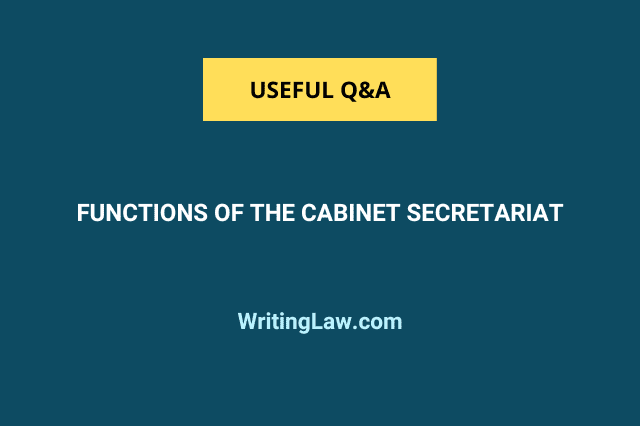
In this law article, you will study about Cabinet Secretariat and its various functions, roles and discretionary powers.
Status and Branches of the Cabinet Secretariat
Cabinet Secretariat is an extra-constitutional body that is given the status of the Department of Government of India under the Allocation of Business Rules, 1961. It is a staffing agency headed by the Cabinet Secretary, the senior-most civil servant in India.
Cabinet Secretariat is divided into three parts:
- Civil: It is considered the main part of the Cabinet Secretariat as it aids and advises the union cabinet of ministers.
- Military: It is to provide better coordination between the civil and the intelligence wings of the Cabinet Secretariat.
- Intelligence: The purpose of the intelligence unit is to assist the Cabinet Secretariat with matters of national and strategic importance.
The Research and Analysis Wing (RAW) is a part of the Cabinet Secretariat.
Functions of the Cabinet Secretariat
1. Cabinet Secretariat provides secretarial assistance to the Cabinet Committee and cabinet ministers.
2. After getting instruction from the Prime Minister, the Cabinet Secretariat decides the day, place, time, and agenda of the cabinet meeting.
3. Cabinet Secretariat is responsible for informing all cabinet-rank ministers about the meeting and the agenda of the meeting if the subject matter is related to the ministry not headed by a cabinet minister.
4. Cabinet Secretariat is the eye of the Prime Minister. The ministry of state should be present at the meeting. Cabinet secretaries will send an invitation letter to the minister of state, independent charge.
5. After the cabinet meeting, the Cabinet Secretariat will keep the record and inform the President and the Vice-President about the decisions the cabinet made. Cabinet Secretariat is responsible for monitoring and coordinating the proper implementation of the decisions taken by the cabinet.
6. Cabinet Secretariat will not be authorised to supervise the ministry and will not intervene in the day-to-day affairs of the ministry.
7. As per the instruction of the President of India, Cabinet Secretariat will allocate a portfolio after the oath-taking ceremony (which will also be decided by the Cabinet Secretariat after consulting the Prime Minister-designate).
8. Cabinet Secretariat is authorised to receive the resignation letter of any minister and will send that resignation letter to the President of India.
Role and Discretionary Powers of Cabinet Secretariat
1. The Cabinet Secretary is the chief manager in crisis.
2. The Cabinet Secretary is the chief co-ordinator at the union level.
3. The Cabinet Secretary is the chairperson of the senior selection board responsible for the appointment of a joint secretary-level officer.
4. He is the secretary to the Appointment Committee and selects officials for the post of secretary.
5. The Cabinet Secretary is the chairperson of the Chief Secretaries’ conference.
6. He presides over the meeting of secretaries of different ministries of the union government.
7. During cabinet meetings, the Cabinet Secretary sits with the Prime Minister and acts as a chief advisor.
8. The Cabinet Secretary is also called the eye and ear of the Prime Minister.
9. The Cabinet Secretary is the centre of the Indian Administrative System.
10. He is the custodian of ethics and morality, neutrality, anonymity and impartiality in the Indian Administrative System.
11. He is the chief motivator and morale booster for civil servants in India.
Analysis
In that way, the Cabinet Secretariat and the Cabinet Secretary are the real custodians of administration in our country without being involved in the day-to-day politics of the country.
- Role and Duties of Indian Prime Minister Are Written or Decisive? - 3rd January 2023
- Role and Function of Central Vigilance Commission of India - 25th December 2022
- What Are the Roles and Functions of the Cabinet Secretariat? - 24th December 2022







